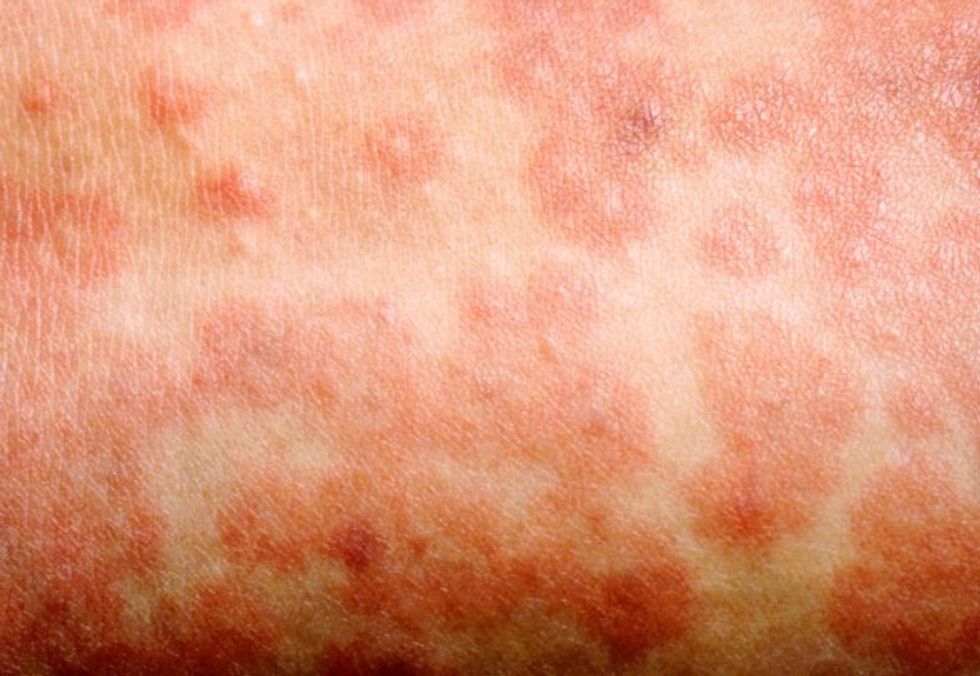Doctors are sounding the alarm as scabies is on the rise across England
Getty Images
Health officials stress the need for prompt treatment and awareness
Don't Miss
Most Read
Trending on GB News
Doctors in England are urging the public to be on high-alert as cases of scabies surge across the country.
The Royal College of GPs (RCGP) reports a sharp rise in diagnoses, particularly in areas where people live in close proximity, such as universities and care homes.
NHS figures reveal a staggering increase, with 3,689 cases diagnosed in hospitals in England in the year to April, up from 2,128 the previous year.
Professor Kamila Hawthorne, RCGP chairwoman, notes that while incidences remain infrequent, the number of GP diagnoses is "above the five-year average and rising, with the north of England seeing a spike in cases".

NHS figures reveal a staggering increase, with 3,689 cases diagnosed in hospitals in England this year
Getty Images
The surge in cases is particularly concerning in communal living environments, highlighting the rapid spread of scabies in close-contact settings.
Experts fear the actual number could be far higher due to the social stigma surrounding the condition, which may prevent people from seeking treatment.
Prof Hawthorne emphasises the importance of not ignoring symptoms.
She told the BBC: "It is important that they don't ignore their symptoms as this could lead to them getting worse and risks transmitting the condition to other people."
Doctor Alison George, a GP in northern England, notes that many students are presenting at A&E only after the condition has worsened.
"It can be really nasty. It is then really difficult to treat if you've got a really large area of the body covered in it," she explained to the BBC.
Health officials stress the need for prompt treatment and awareness to curb the rising trend of scabies infections across England.
Doctor Ross Perry, GP and medical director at Cosmedics Skin Clinics, describes it as "an incredibly uncomfortable itchy and bumpy rash".
The rash may take up to eight weeks to appear, during which time it can spread rapidly. This delay in visible symptoms contributes to its contagious nature.
The NHS notes that the red, itchy bumps can appear anywhere on the body, but often affect hands, fingers, waist, groin and armpits.
Doctor Perry explains that these symptoms are caused by "the saliva, eggs and faeces of the parasite mite sarcoptes".
The condition spreads through prolonged skin-to-skin contact or via bedding, clothing and towels.
LATEST HEALTH DEVELOPMENTS

The NHS notes that the red, itchy bumps can appear anywhere on the body
NHSHow is scabies treated?
According to Doctor Perry, the standard approach involves applying a cream or lotion over the entire body, with a repeat application one week later. However, special care is needed for toddlers, babies under two, and pregnant or breastfeeding individuals.
All household members should be treated, even if asymptomatic. The NHS advises contacting sexual partners from the past eight weeks for treatment.
Hygiene measures are crucial. Perry recommends washing clothes, bedding, and towels on a hot wash immediately. Carpets and furniture should be vacuumed thoroughly.
"Personal hygiene is also of paramount importance, washing thoroughly, particularly frequent washing of the hands, and avoiding sexual contact if you suspect you might have scabies until treatment is completed," Perry added.
These steps are essential to prevent reinfestation and further spread of the condition. Prompt and thorough treatment is key to managing the current surge in scabies cases across England.








